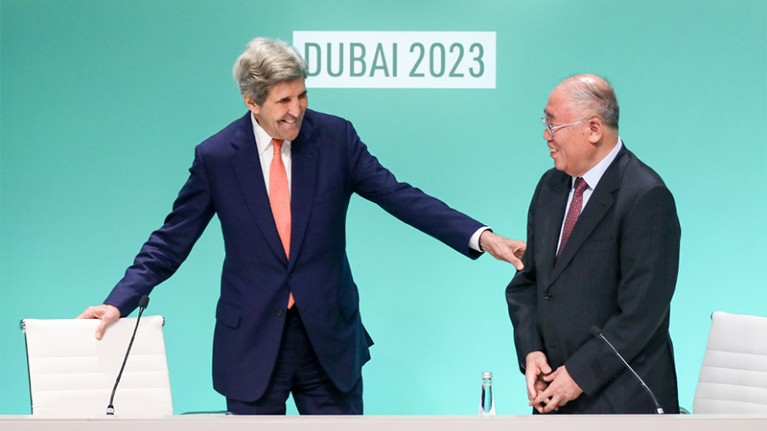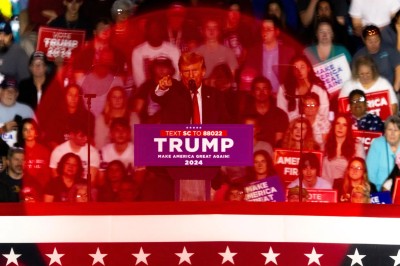[ad_1]

John Kerry and Xie Zhenhua’s friendship kept US–China climate negotiations rolling even when the two countries disagreed on other matters.Credit: Fadel Dawod/Getty
Researchers are regarding the parallel retirements of the US and Chinese climate envoys with apprehension, saying that the change could rattle the current co-operative spirit between the world’s two biggest carbon emitters.
John Kerry’s term as US climate envoy ended on 6 March. In January, his counterpart in China, Xie Zhenhua, also officially retired as climate envoy.
The friendship between the two men was seen as integral to maintaining an open door on climate issues, even when the powerful countries did not see eye-to-eye on other matters. “We are indeed turning a page when it comes to the US–China climate relationship,” says Li Shuo, director of the China Climate Hub, Asia Society Policy Institute, in Washington DC. “I hope it still remains one of the rare bright spots.”
But bigger concerns for researchers in the year ahead are US elections and broader geopolitical tensions, which they say could undermine progress towards achieving global climate goals.
A workable, healthy relationship between the United States and China is a prerequisite for collective climate action, says Li. It was crucial to the success of the 2015 Paris climate agreement and will play a defining role as countries finalize their climate commitments, which are expected to be submitted by early 2025, he says.
Climate veteran Xie has been replaced by Liu Zhenmin, a diplomat. In Kerry’s place, John Podesta, a strategist for the Democratic party, has been appointed senior advisor to the president for international climate policy, according to a spokesperson for the US Department of State. The role is not a direct replacement of Kerry’s position, but Podesta will dedicate significant time to international climate policy working with the special climate envoy office, and continue to oversee implementation of the Inflation Reduction Act, a massive climate and tax bill signed by current President Joe Biden in 2022, the spokesperson said.
In a public interview on 1 March, Kerry said that he and Xie will continue to maintain connections through their respective work at Yale University in New Haven, Connecticut, and Tsinghua University in Beijing.
Good friends
Xie and Kerry’s friendship and understanding of climate issues allowed them to broker agreement, “despite the vicissitudes of the US–China relationship”, says Barbara Finamore, who studies environmental policy and law with a focus on China at the Oxford Institute for Energy Studies in the United Kingdom, and who is based in Londonderry, New Hampshire.
Kerry visited China three times as climate envoy, including at the height of the COVID-19 pandemic when China had imposed strict restrictions on travel.
The two found ways to engage even when tensions escalated, says Fan Dai, director of the California–China Climate Institute at the University of California, Berkeley. For example, in August 2022, Nancy Pelosi, then speaker of the US House of Representatives, made a high-profile trip to Taiwan. China responded by imposing a year-long freeze on climate talks with the United States. During that time, Xie and Kerry remained in contact so they could be “instantly ready” to restart official talks when the situation improved, says Dai.
And in November 2023, the two met in Sunnylands, California to re-establish formal dialogue on topics such as energy policy and transportation. During their tenures, they facilitated stronger cooperation between cities, provinces and regions in the two countries. “Their work tried to carve out a special space for climate policy,” says Li.
Xie and Kerry are considered “heroes”, says Gang He, an energy-systems modeller at Baruch College in Manhattan, New York City. “They represent the height of what can be achieved with climate diplomacy.”
New envoys
Researchers say that Xie’s and Kerry’s departures bring uncertainty, but are reassured by the climate credentials of their replacements. Still, it remains to be seen how well they will work together, they say.
Liu is a long-time foreign-services bureaucrat, who has worked at the United Nations and been involved in climate negotiations since the mid-1990s. “He is not a stranger to climate issues,” says Li. But engaging in detailed negotiations in a highly politicized environment will be a “learning process”, for Liu, says Wang Yi, who studies energy and environment public policy at the Chinese Academy of Sciences’ Institutes of Science and Development in Beijing, and who has been a member of the Chinese delegation in global climate negotiations.
Dai will pay close attention to how Liu responds to unfriendly questions from journalists about China’s climate actions. Xie always responded in a “sophisticated” way, relying on lots of data, she says.
Another challenge for Liu will be co-ordinating multiple agencies, Dai says. Climate change is an issue that cuts across energy, natural resources and the economy. In China, it falls under the remit of the Ministry of Ecology and Environment, which typically has had a narrow scope of environmental protection, pollution and enforcement, says Dai.
Podesta has advised multiple US presidents, including on clean-energy innovation for Biden, and founded a think-tank, the Center for American Progress in Washington DC. “He is brilliant on climate issues,” says Finamore.
The good personal relationship between Xie and Kerry made engagement easier, but behind these individuals are the interests and powers of the countries they represent, says Wang. For now, the United States and China have shown their willingness to co-operate on climate. “They could have decided not to appoint any successors,” says Finamore. “The fact that they are even there is very important.”
US elections
But the two won’t have much time to get to know each other before what researchers see as a major hurdle comes into view — the US presidential election in November 2024. “The biggest uncertainty is American politics,” says Wang.
How five crucial elections in 2024 could shape climate action for decades
Biden’s predecessor and 2024 election opponent, Donald Trump, withdrew the United States from the 2015 Paris climate agreement when he was president. “I’m hoping that history will not repeat again,” says Wang. Biden rejoined the agreement on his first day in office.
“We definitely have more hope for a Biden world, because that means more consistency,” says Dai.
Others worry that geopolitical tensions and a focus on competition could scupper progress. “The climate agenda remains rather fragile in the context of the broader US–China relationship,” says Li. “What if another Pelosi-like event happens?”
But researchers say that a lot of progress has been made to formalize ties that should withstand a change in administration and be resilient to geopolitics. Dai lists several initiatives occurring at the sub-national level, including between Kentucky and Shanxi; Seattle and Shenzhen; Houston, Chengdu, New York and Guangzhou. Those, and collaborations between academics and companies create avenues for technical exchange regardless of which party is in power, says Dai.
As He puts it: “if the river freezes over, water will still flow underneath”.
[ad_2]
Source Article Link


